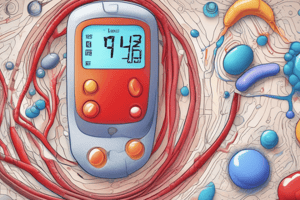Podcast
Questions and Answers
What is the normal range for fasting blood glucose?
What is the normal range for fasting blood glucose?
- 4.0-7.0 mmol/L (correct)
- 5.5-10.0 mmol/L
- 3.0-5.5 mmol/L
- 6.0-8.0 mmol/L
Which of the following represents a potentially abnormal fasting blood glucose level?
Which of the following represents a potentially abnormal fasting blood glucose level?
- 6.2 mmol/L
- 5.5 mmol/L
- 4.5 mmol/L
- 3.8 mmol/L (correct)
What is the normal range for random blood glucose?
What is the normal range for random blood glucose?
- 4.0-7.0 mmol/L (correct)
- Less than 4.0 mmol/L
- 4.0-11.0 mmol/L
- 7.1-10.0 mmol/L
If a patient has a random blood glucose level of 7.5 mmol/L, how does it compare to the normal range?
If a patient has a random blood glucose level of 7.5 mmol/L, how does it compare to the normal range?
Which test specifically measures fasting blood glucose levels?
Which test specifically measures fasting blood glucose levels?
What implications could arise from having a fasting blood glucose level below 4.0 mmol/L?
What implications could arise from having a fasting blood glucose level below 4.0 mmol/L?
Explain the potential health risks associated with a random blood glucose level exceeding 7.0 mmol/L.
Explain the potential health risks associated with a random blood glucose level exceeding 7.0 mmol/L.
How does the measurement of fasting blood glucose differ from that of random blood glucose?
How does the measurement of fasting blood glucose differ from that of random blood glucose?
What factors could potentially affect fasting blood glucose levels in a patient?
What factors could potentially affect fasting blood glucose levels in a patient?
Why is regular monitoring of blood glucose levels important for individuals with known glucose regulation issues?
Why is regular monitoring of blood glucose levels important for individuals with known glucose regulation issues?
How can fasting blood glucose levels be used to assess a person's metabolic health?
How can fasting blood glucose levels be used to assess a person's metabolic health?
What are the potential consequences of a fasting blood glucose level consistently above 7.0 mmol/L?
What are the potential consequences of a fasting blood glucose level consistently above 7.0 mmol/L?
In clinical practice, what role do random blood glucose measurements play compared to fasting blood glucose tests?
In clinical practice, what role do random blood glucose measurements play compared to fasting blood glucose tests?
Why might a healthcare provider recommend fasting blood glucose tests over random blood glucose tests?
Why might a healthcare provider recommend fasting blood glucose tests over random blood glucose tests?
What lifestyle factors could impact a person's fasting blood glucose levels?
What lifestyle factors could impact a person's fasting blood glucose levels?
Flashcards are hidden until you start studying
Study Notes
Blood Glucose Levels
- Normal Fasting Blood Glucose: 4.0-5.5 mmol/L
- Potentially Abnormal Fasting Blood Glucose: Below 4.0 mmol/L or above 5.5 mmol/L
- Normal Random Blood Glucose: 4.0-7.8 mmol/L
- Random Blood Glucose of 7.5 mmol/L is: Within the normal range for random blood glucose levels.
- Fasting Blood Glucose Test: Specifically measures blood glucose levels after an overnight fast.
Fasting Blood Glucose
- Normal range: 4.0 - 5.5 mmol/L
- Potentially abnormal level: Below 4.0 mmol/L or above 5.5 mmol/L
Random Blood Glucose
- Normal range: 4.0 - 7.0 mmol/L
- 7.5 mmol/L exceeds the normal range and indicates potential hyperglycemia
Specific Tests
- Fasting blood glucose test specifically measures glucose levels after an overnight fast
Implications of Low Blood Glucose
- Fasting blood glucose below 4.0 mmol/L can lead to hypoglycemia, characterized by symptoms like dizziness, confusion, and fatigue
Risks of High Blood Glucose
- Random blood glucose exceeding 7.0 mmol/L can indicate hyperglycemia, potentially leading to long-term complications like cardiovascular disease, nerve damage, and kidney failure
Blood Glucose Measurement Differences
- Fasting blood glucose is measured after an overnight fast (8-12 hours), while random blood glucose can be measured at any time
Influencing Factors
- Fasting blood glucose levels can vary depending on factors like stress, medications, and recent meals
Importance of Monitoring
- Regular monitoring of blood glucose levels is crucial for individuals with known glucose regulation issues, such as diabetes, to manage blood sugar and prevent complications
Fasting Blood Glucose
- Normal range: 4.0 - 5.5 mmol/L
- A fasting blood glucose level below 4.0 mmol/L could indicate hypoglycemia, leading to fatigue, dizziness, and potential loss of consciousness.
- Consistently above 7.0 mmol/L indicates prediabetes or type 2 diabetes.
- Potential health risks associated with a blood glucose level exceeding 7.0 mmol/L include increased risk of heart disease, stroke, nerve damage, and kidney disease.
Random Blood Glucose
- Normal range: 4.0 - 7.0 mmol/L
- A random blood glucose level of 7.5 mmol/L is above the normal range, indicating potential hyperglycemia.
Fasting vs. Random
- Fasting blood glucose measures blood sugar after an overnight fast (8-12 hours)
- Random blood glucose can be taken at any time of day, regardless of eating times.
Factors Affecting Fasting Blood Glucose
- Recent food intake
- Stress
- Exercise
- Medications
- Hormonal changes
- Certain medical conditions (e.g. liver disease, kidney disease)
Monitoring Blood Glucose
- Regularly monitoring blood glucose levels is crucial for people with known glucose regulation issues (e.g. diabetes) to manage their condition and prevent complications.
Clinical Applications
- Random blood glucose measurements are useful for screening purposes and in emergency situations.
- Fasting blood glucose tests are more specific for diagnosing diabetes and monitoring treatment effectiveness.
Lifestyle Factors
- Dietary choices (e.g. high sugar intake, refined carbohydrates)
- Physical activity levels
- Smoking
- Stress
- Sleep quality
Studying That Suits You
Use AI to generate personalized quizzes and flashcards to suit your learning preferences.




